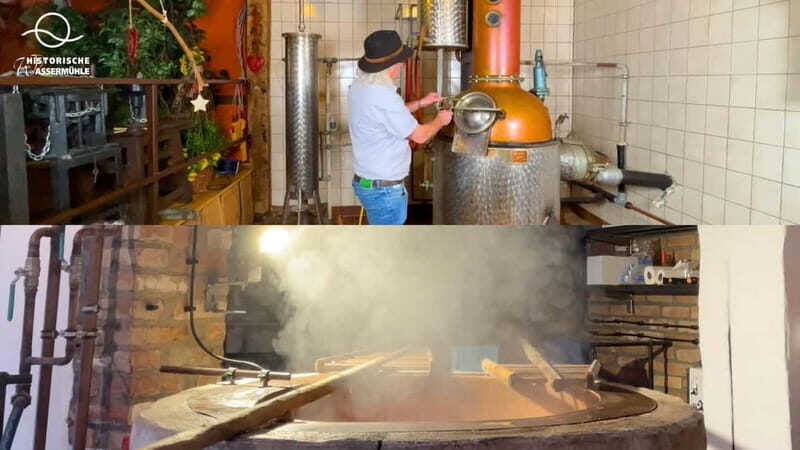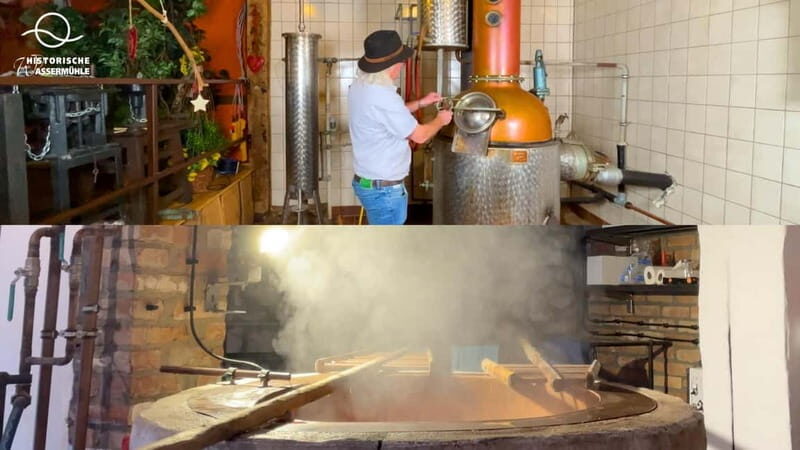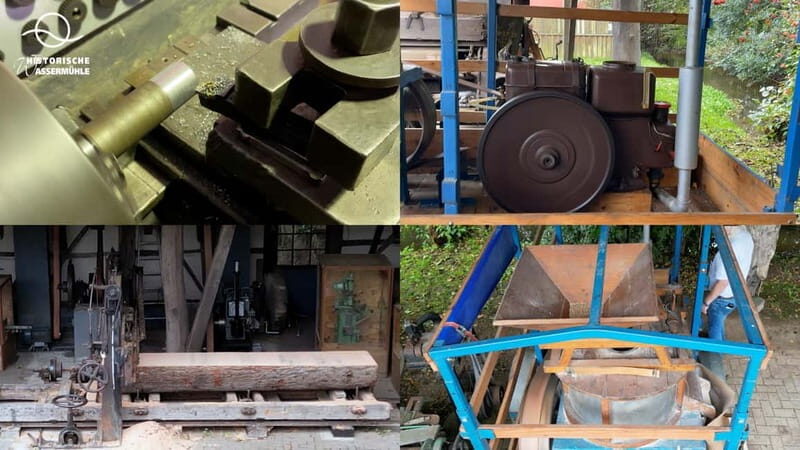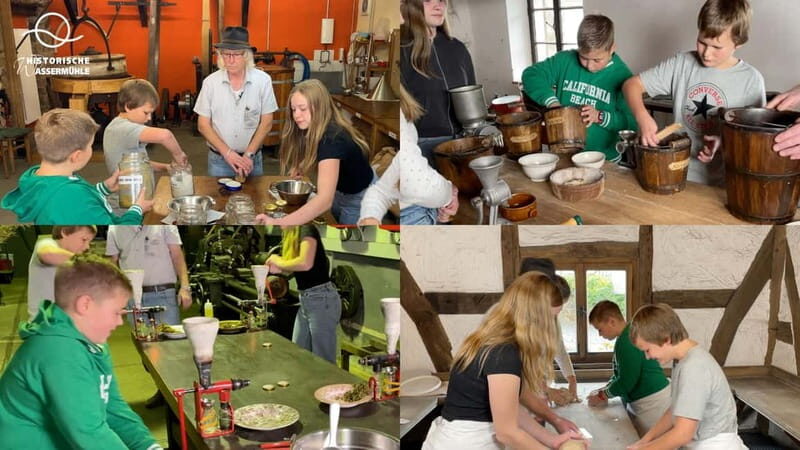Physical Address
304 North Cardinal St.
Dorchester Center, MA 02124
Physical Address
304 North Cardinal St.
Dorchester Center, MA 02124

Discover the largest active technology museum in Germany at Birgel Watermill with live demonstrations, historic machinery, and family-friendly activities.
Exploring the Birgel Watermill in the Eifel region offers a unique window into Germany’s industrial past. This museum isn’t just about static displays; it’s a lively, working tribute to traditional craftsmanship and mechanical ingenuity. Visitors get to witness historic machines like a steam engine from 1917 and a water turbine operating in real time, making it an engaging experience for all ages.
What we particularly love about this museum is the hands-on nature of the demonstrations. You’re not just observing artifacts behind glass—you see machinery in action, which makes the history come alive in a way that’s both educational and fun. However, with so many interactive features and a busy schedule on selected days, planning ahead is essential to maximize your visit.
For those interested in technology, engineering, or family outings that combine learning with entertainment, this tour hits the mark. It’s especially suited for curious kids and adults alike who want a tangible connection to how everyday life was powered in the past. Keep in mind, some areas involve stairs, so accessibility might be a consideration for those with mobility issues.


The Birgel Watermill in the Rhineland-Palatinate offers a fascinating snapshot of industrial heritage, brought to life on specially scheduled days throughout 2025. As we explore what this experience entails, it’s clear that this isn’t just a typical museum—it’s a dynamic, working site where history is demonstrated rather than just displayed.
Looking for more options in Birgel? Here are some other experiences worth considering.
One of the most captivating features is the fully operational steam engine from 1917. Seeing this steam engine in motion, with its rhythmic chugging and steam billowing, immediately transports you back in time. It’s a rare opportunity to observe such machinery working, as most are static exhibits elsewhere. The engine’s age, over a century, underscores the durability and craftsmanship of early 20th-century engineering.
Alongside the steam engine, you’ll find a mechanical oil press still in operation after over 130 years. We loved the way the demonstrations allow visitors to see traditional oil extraction, giving a tangible understanding of how essential oils were produced in the past. It’s a quiet but powerful reminder of the resourcefulness before modern automation.
Another highlight is the three-storey grain mill, powered by a water turbine. As you walk through, you’ll get insights into how grain was processed before industrial-scale milling. The water turbine, visible during the demonstration, emphasizes how water power was harnessed efficiently in rural Germany. Watching the water spin the millstones provides a visceral sense of the powering force that shaped agricultural communities.
The opportunity to see old diesel engines, generators, and drive machines further illustrates the evolution of technology and how machinery was adapted over time. For visitors interested in engineering, hearing expert explanations about how these machines work adds real depth to the visit.
Beyond observing, the museum offers hands-on activities—though these are not included in the standard admission fee. Kids can under supervision, bake bread using traditional methods, make muesli from oats, or press oil with simple tools. One reviewer noted, “The children’s program was a real hit—my kids loved pressing oil and making mustard—it was educational and fun.” These activities, priced at an additional 8 euros per item or 25 euros for full access, help bring history to life in a memorable way.
For food lovers, the mustard mill producing the legendary mill mustard is a highlight. Seeing how mustard is made on-site, with traditional equipment, offers a different perspective on local specialties. The Schöpfbrauerei (water-powered brewery) adds another layer of authenticity, where visitors can learn about traditional brewing processes. While tasting is not included, the on-site facilities provide the chance to sample local brews or purchase souvenirs.
The ticket prices are reasonable, especially considering the scope of the experience: €12 for adults, €7 for children aged 3-14, and €30 for a family ticket. Given the number of demonstrations, live explanations, and access to different areas, this provides strong value for a full-day cultural outing.
The museum operates only on selected dates in 2025, such as April, July, August, and October. It’s advised to check availability and book in advance, especially since the tour is guided in German. The “reserve now and pay later” option offers flexibility, and free cancellation up to 24 hours before the visit gives peace of mind.
The site is largely accessible, though some areas require stairs—good to note if mobility is a concern. Facilities like free parking, toilets, and baby changing stations make the visit easier for families.
The atmosphere is family-friendly and welcoming. Visitors consistently mention how engaging and informative the demonstrations are, with guides providing clear, expert explanations. The grounds are extensive, with many stations allowing visitors to explore multiple aspects of historical technology.
Many reviewers appreciated the blend of education and entertainment, especially for children. One parent shared, “My kids loved the bread baking and mustard making—activities they still talk about weeks later.” It’s clear that this experience balances fun with learning, making it perfect for curious families or groups interested in engineering history.

This tour is ideal for families, history buffs, engineering enthusiasts, or anyone looking for an interactive day out outside the usual museum visit. It works well for those who appreciate seeing machinery in action and enjoy learning about traditional craftsmanship. If you’re traveling with children, the extra activities make it a memorable trip. However, if accessibility is a concern, check the specific site layout beforehand.

Visiting the Birgel Watermill offers a rare glimpse into how water and steam power once drove German industry and rural life. It’s a lively, authentic experience where you don’t just observe history—you witness it in motion. The combination of working machinery, expert explanations, and family-friendly activities makes this a well-rounded outing that appeals to a variety of interests.
While the scheduled dates mean planning ahead is essential, the overall experience promises a meaningful, educational, and fun day out. Whether you’re a tech enthusiast, a curious family, or someone interested in traditional crafts, this visit provides a rewarding look at the tools that shaped daily life.
For those seeking an immersive, interactive, and historic adventure, the Birgel Watermill stands out as a must-see in the Eifel region.
What is included in the admission ticket?
Your ticket provides access to the entire Museum of Technology, including all demonstration areas, the historic watermill tour, and insights into traditional craftsmanship.
Are there live demonstrations?
Yes, visitors can see live demonstrations of functioning machines, such as the steam engine from 1917, the oil press, and the water turbine.
Can children participate in activities?
Children can participate in activities like baking bread, making muesli, pressing oil, or making mustard—these are available for an extra charge and under supervision.
Is the museum accessible for people with mobility issues?
The museum is largely barrier-free, but some areas are only accessible via stairs, so mobility considerations should be checked in advance.
Is parking available on-site?
Yes, there is free parking directly at the museum, making it easy to visit without hassle.
Can I cancel or reschedule my booking?
Yes, you can cancel up to 24 hours in advance for a full refund and reserve your spot with a pay later option to keep your plans flexible.